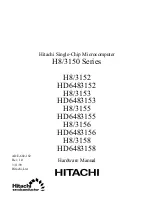
Sun Microelectronics
176
UltraSPARC User’s Manual
Since the AFSR is not reset by power on reset, error logging information is pre-
served. Software can examine system registers to determine that reset was due to
a P_FERR, and which node generated it. The appropriate AFSR can be read to de-
termine the cause of the P_FERR. During a real power on (indicated by the reset
registers), software should clear AFSR to avoid false errors.
11.1.2 Deferred Errors
Deferred errors may corrupt the processor state, and are normally unrecoverable.
Such errors lead to termination of the currently executing process or result in a
system reset if system state has been corrupted. Error logging information allows
software to determine if system state has been corrupted.
A MEMBAR
#Sync
instruction provides an error barrier for deferred errors. It
ensures that deferred errors from earlier accesses will not be reported after the
membar. A MEMBAR
#Sync
should be used during context switching to provide
error isolation between processes.
Note:
After a deferred trap, the contents of TPC and TNPC are undefined
(except for the special peek sequence described below). Generally, they do not
contain the oldest non-executed instruction and its next PC. As a result, execution
cannot normally be resumed from the point that the trap is taken. Instruction
access errors are reported before executing the instruction that caused the error,
but TPC does not necessarily point to the corrupted instruction. Errors due to
fetching user code after a DONE/RETRY are always reported after the DONE or
RETRY. This guarantees that system code will not be aborted by a user mode
instruction access.
When a deferred error occurs and the corresponding error trap is enabled in the
E-Cache Error Enable Register (see Section 11.3.1, “E-Cache Error Enable Regis-
ter,” on page 179), an
instruction_access_error
or
data_access_error
trap is generated.
Deferred errors include:
•
Data parity error during access from E-Cache or UDB, excluding writeback or
copyback.
•
Uncorrectable ECC error in memory access or interrupt vector. Uncorrectable
ECC errors on cache fills will be reported for any ECC error in the cache block,
not just the referenced word.
•
Time-out or bus error during a read access from the system bus. Intentional
peeks and pokes to test presence and operation of devices are recoverable only
if performed as follows. The access should be preceded and followed by
MEMBAR
#Sync
instructions. The destination register of the access may be
Artisan Technology Group - Quality Instrumentation ... Guaranteed | (888) 88-SOURCE | www.artisantg.com
















































